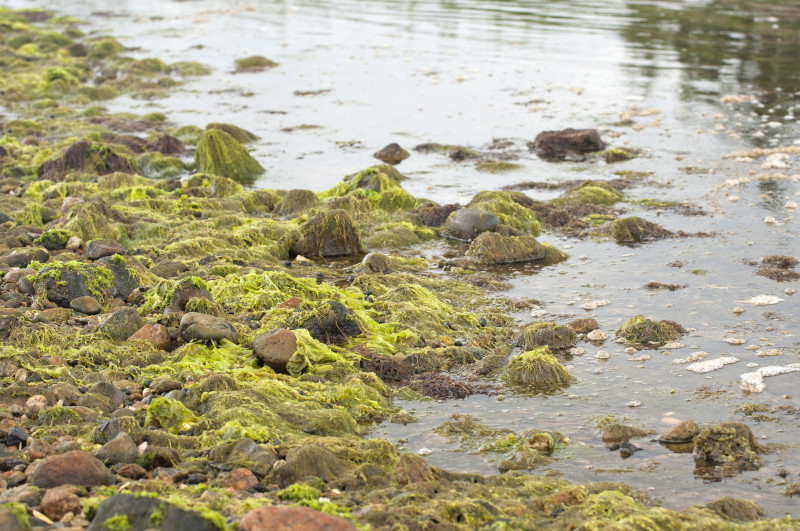Mattapoisett’s enforcement of wetland protection laws shows importance of local conservation commissions
When a Mattapoisett homeowner begins the work to restore a sensitive wetland and buffer zone on Eel Pond that he illegally converted into a lawn, it will be because of the dedication, diligence, and commitment of the town Conservation Commission. These local boards play a vital role in our effort to save Buzzards Bay by upholding the laws that protect wetlands.

Nitrogen pollution in Eel Pond fuels the growth of algae blooms that harm the pond’s health.
The Coalition regularly works with conservation commissions in towns across the region to conserve land and ensure that the Bay’s wetlands – such as salt marshes and wooded freshwater swamps – aren’t being damaged. Wetlands are powerful pollution filters that can absorb as much as 90% of the harmful nitrogen pollution flowing across the land from nearby development. They also provide habitat for wildlife and protect our homes from flooding.
Every municipality in Massachusetts has a conservation commission: a volunteer board of three to seven members appointed by the selectmen or city council. Each conservation commission administers the Massachusetts Wetlands Protection Act, which safeguards wetlands for their public benefits such as flood control, preventing pollution, and preserving wildlife habitats and clean drinking water.
When a homeowner or a developer wants to build, plant, or remove anything that’s within 100 feet of a wetland – called the “buffer zone” – the local conservation commission carefully reviews the proposed work. On a case-by-case basis, the commission works to ensure that these proposed activities won’t harm the important public benefits that wetlands provide for people, water, and wildlife. If they will, then the conservation commission requires the homeowner or developer to create a plan that describes how they will protect the wetlands.
In the case of the Mattapoisett homeowner we mentioned above, this process is working backwards. Despite special protections to reduce nitrogen pollution to Eel Pond, the homeowner turned 20,000 square feet of buffer zone and wetlands into a perfectly manicured lawn. His lawn now cuts deeply into the buffer zone, where natural plants and trees were supposed to have been left undisturbed. Now he’s seeking a variance well after the damage has been done.
The Coalition alerted the Mattapoisett Conservation Commission about these violations after we discovered them two years ago. And from the very beginning, the conservation commission made it clear they expected the homeowner to complete a restoration plan to fix the violations. But the plan the homeowners submitted didn’t do enough to restore the damage. Last fall, the commission took enforcement action against the homeowners, and the issue went to court.
Along with 12 Mattapoisett residents and the support of the town, the Coalition intervened in the court case to help the conservation commission defend its enforcement order. The court affirmed the Mattapoisett Conservation Commission, but the homeowner has appealed that decision.
The homeowner has also appealed the conservation commission’s order to restore his lawn to the Massachusetts Department of Environmental Protection, which has the authority to overrule the local decision. We’ve weighed in by writing a letter to the state, advocating for the conservation commission’s decision to protect the health of Eel Pond.
Many people ask how they can help our environment, especially in the current political climate. This case shows that one of the most important things you can do is get involved in your community to ensure that local decision-makers protect our waters, wetlands, and wildlife habitats. Learn how decisions are made in your town or city and make your voice heard: attend public meetings, vote in elections, and even run for office if you can. It’s through local actions like those of the Mattapoisett Conservation Commission that we can make the biggest difference for the future of Buzzards Bay.